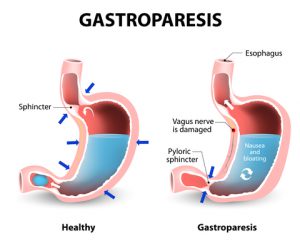Gastroparesis Overview
 Gastroparesis, or “paralysis of the stomach,” is a digestive motility disorder in which the stomach fails to contract properly. Consequently, food and/or liquids may fail to empty into the intestines at the proper rate.
Gastroparesis, or “paralysis of the stomach,” is a digestive motility disorder in which the stomach fails to contract properly. Consequently, food and/or liquids may fail to empty into the intestines at the proper rate.
Under normal conditions, the muscles and nerves of the stomach coordinate to push partially digested material into the small intestine. Gastroparesis involves a disruption to the muscles and/or nerves, preventing the stomach from moving its contents downward. Food and/or liquids may remain in the stomach for an abnormally long time.
Gastroparesis symptoms can be debilitating and, in some cases, life-threatening. These symptoms may include stomach/abdominal pain, bloating, nausea, vomiting, heartburn, acid reflux/GERD and early satiety. Over time, these issues can lead to serious complications such as malnourishment, dehydration, extreme weight loss/fluctuations, esophageal damage, erratic blood sugar levels, bezoars and overwhelming fatigue.
The National Institutes of Health (NIH) estimates that more than 5 million people live with gastroparesis. The most common known cause of this condition is diabetes, which accounts for about one-third of the cases. Other known causes of gastroparesis include neurologic disorders such as Multiple Sclerosis and Parkinson’s Disease; connective tissue disorders; complications resulting from surgeries; prolonged use of various medications (such as some narcotics and antidepressants); and direct damage to the vagus nerve. Most cases of gastroparesis, however, are labeled “idiopathic,” meaning that there is no known cause.
Gastroparesis is most commonly diagnosed by the Gastric Emptying Study (GES), a procedure in which radioactive material (food and/or liquid) is traced by a scanner as it moves through one’s digestive tract. Other methods of diagnosis include upper endoscopy, barium x-rays, gastric manometry and the wireless motility capsules (SmartPill) which, when swallowed, transmit data regarding the rate of passage through the entire digestive tract.
Treatments for gastroparesis include dietary changes (small, frequent meals low in fat and fiber), prokinetic medications (which increase motility), and symptom-management medications. For cases which do not respond to these treatments, surgeries and/or supplemental nutrition methods (such as feeding tubes or total parenteral nutrition) may be advised.



